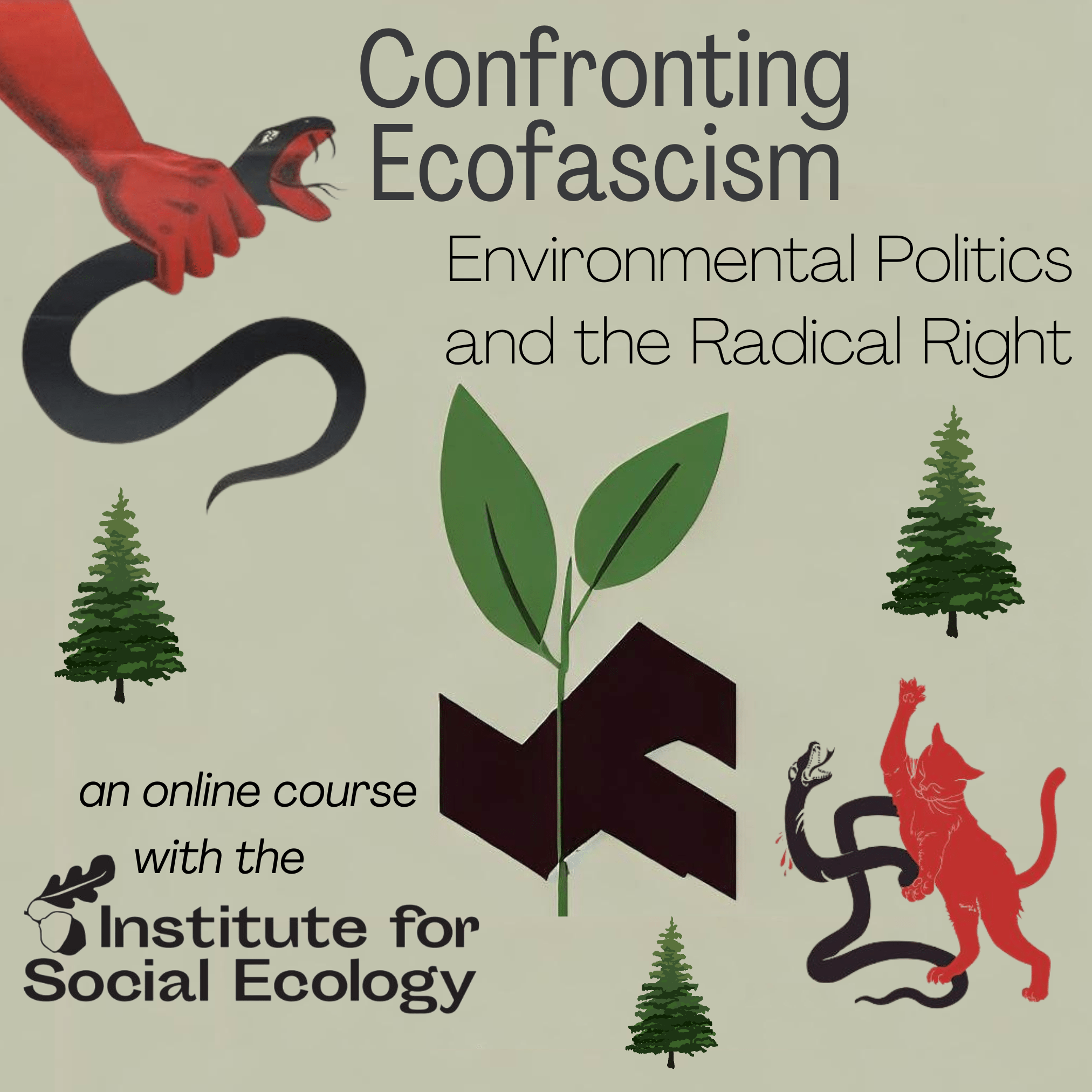Next offered: TBA
Instructors: Peter Staudenmaier, Blair Taylor, Michael Premo, and Richard Hames
This course is also available as a self-directed flex course here, which can be taken at any time. It may also be taken for college credit. Please inquire at social-ecology@mail.mayfirst.org for details.
Course Description
Although today ecology is largely understood as a movement of the political left, the history of environmental thought and action demonstrates it to be much more complex and politically ambivalent. The ecofascist manifestos left by the Christchurch and El Paso shooters have given a new visibility to right wing ecology in general and ecofascism in particular, but they build on a much longer history of reactionary politics in ecological guise. There is an urgent need to understand and combat these deadly ideologies, and to consider how they complicate our movements to build a free and ecological society.
The course will look at the history of right-wing ecology up until the present, spanning green tendencies within Nazism in Germany, far-right parties that blame immigrants for climate change, to ecofascists who use population ecology to advocate white ethnostates. We’ll also look at how ecological ideas have been utilized by less explicitly right-wing environmental actors to reinforce anti-egalitarian views, from the racist and colonial foundations of conservation ecology to key voices in radical environmental movements like Earth First! decrying non-white immigration. We will examine what ecological topics and themes are harnessed to racist, sexist, and eugenicist ends, and dig into the theoretical and philosophical assumptions about nature lurking behind them. Lastly, we will discuss how activists today can avoid falling into these traps, respond to the growth of right-wing ecological discourse, and offer a more compelling liberatory vision of ecology.
The course aims to give participants tools for assessing the political moment and the conditions we live in, understand the historical development of ecofascism and the context of its current expressions, and to leave feeling more prepared to recognize and challenge ecofascist tendencies.
Weekly Lecture Schedule:
June 7th: Ecofascism: History and Controversy
Instructor: Peter Staudenmaier
Environmentalism is often considered unambiguously progressive, an ideal fit with principles of equality and social justice. But the history of environmental politics is much more complex, appearing across the entire spectrum from left to right. Since the 1970s, activists on the ecological left have used the term ‘ecofascism’ to warn against the persistent phenomenon of far right environmentalism. This introductory session will offer historical background on right-wing forms of ecology over the past century, as well as a critical overview of ongoing debates around ecofascism in the context of the climate crisis and the global rise of the radical right.
June 14: How the Racist Right Exploits the Climate Crisis – And What We Can Do About It
Instructors: Hilary Moore & Michael Premo
How do far right formations leverage the climate crisis toward domination politics? How do we prevent the co-optation of our own messaging in climate justice campaigns? What counter-moves are available to us as more far right groups engage in the politics of the climate crisis? This introductory session will unpack the ways Left and progressive formations mistakenly cede political space to far right efforts, as well as examine current case studies of resistance, and offer strategic questions on effective coalition-building in this time of rising global authoritarianism.
June 21: Social Ecological Responses to Ecofascism and Far-right Environmentalism in the United States
Instructor: Blair Taylor
This section will examine the ecological politics of the U.S. right, focusing on the so-called “Alt-Right.” We will explore how a variety of anti-egalitarian views – antisemitism, racism, gender traditionalism, homophobia – have been harnessed to and justified by an ecological framework. Analyzing how the alt-right borrows from left and ecological discourses as fascist predecessors have, we’ll focus on how older themes like organic agriculture and animal rights are updated while incorporating new concepts like biocentrism, multiculturalism, ecological anticapitalism, biodiversity, and Indigenism. Ecology has become an increasingly important political theme for those segments of the contemporary far right who reject traditional pro-business conservative positions for various esoteric, revolutionary, and anti-modernist ideologies. What tools does social ecology offer in terms of analysis and offering a more compelling ecological vision?
June 28: Fascism and Ecology in the Neoliberal Age
Instructor: Richard Hames
This section questions the idea of ‘fascism’ and its connection with ecology. What is the current status of ‘fascism’ if the historical movement relied on specific social conditions, such as the presence of mass movements and the practical undermining of state monopolies on violence through paramilitarism, that are no longer present? We will look at political theory that attempts to locate us in a specific moment of capitalist history – neoliberalism – with specific consequences for political form. This will involve opening questions of the relationship between ideology, social and political structure and regimes of accumulation. It will also involve the question of whether we are now exiting this period of history and what this means for far-right movements and their relationship to ecological thought, meditated as it is by the regime of accumulation.


